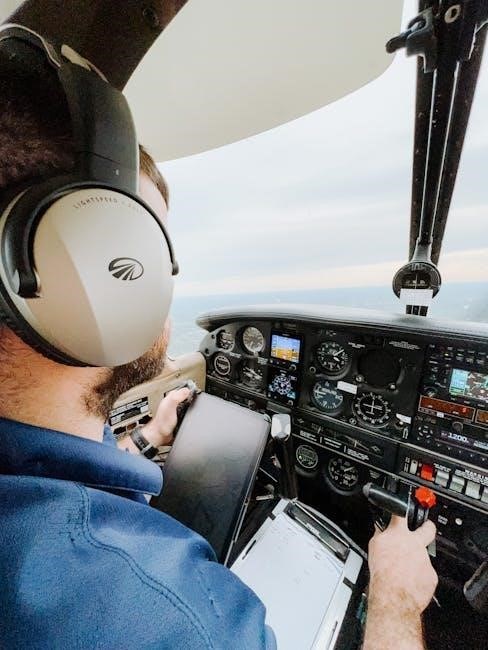
private pilot oral exam guide 2023 pdf
The Private Pilot Oral Exam Guide 2023 is a comprehensive resource for aspiring aviators, aligning with FAA standards and covering aviation regulations, practical flight scenarios, and checkride success.
Overview of the Private Pilot Oral Exam
The Private Pilot Oral Exam is a critical component of the FAA certification process, combining an interview and flight test. It assesses a pilot’s knowledge, decision-making, and ability to apply aviation principles. The exam typically covers aircraft systems, weather, regulations, and emergency procedures. Preparation involves studying FAA materials like the ACS and FARs. The examiner evaluates both theoretical knowledge and practical skills, ensuring candidates are ready for real-world flying scenarios. A passing score demonstrates mastery of essential aviation concepts and safe flight practices.
Importance of Preparation for the Oral Exam
Thorough preparation for the Private Pilot Oral Exam is essential to ensure confidence and success. It helps candidates understand complex aviation concepts, regulations, and safety practices. Without proper preparation, pilots may struggle with common questions about aircraft systems, weather, and emergency procedures. Effective study habits, including reviewing FAA materials and practicing mock interviews, reduce exam anxiety and improve retention. Adequate preparation also demonstrates a commitment to safety and professionalism, which are critical for passing the exam and becoming a competent pilot. It lays the foundation for real-world flying scenarios and lifelong learning in aviation.
Structure of the 2023 Oral Exam Guide
The 2023 Oral Exam Guide is structured to provide a clear, organized approach to preparation. It covers key areas such as aircraft systems, weather, regulations, and emergency procedures; The guide includes sample questions, practical scenarios, and study tips. Each section is designed to align with FAA standards, ensuring candidates are well-prepared for the exam format. By breaking down complex topics into manageable sections, the guide simplifies learning and helps pilots build confidence. Its logical flow ensures comprehensive understanding, making it an indispensable tool for success in the oral exam and beyond.

Preparation Strategies for the Oral Exam
Effective preparation involves mastering FAA regulations, understanding aircraft systems, and practicing with mock interviews. Focus on ACS highlights and real-world scenarios to build confidence.
Understanding the Exam Format and Requirements
The private pilot oral exam is a structured interview evaluating knowledge and practical skills. Candidates must demonstrate understanding of FAA regulations, aircraft systems, weather, and emergency procedures. The exam typically includes a review of qualifications, flight planning, and scenario-based questions. Candidates are also expected to explain aircraft inspections and decision-making processes. The FAA’s ACS outlines specific areas of focus, ensuring consistency in evaluation. A score of 70% is required to pass, emphasizing clarity, accuracy, and confidence in responses. Proper preparation ensures alignment with exam expectations and success.
The Role of the FAA Airman Certification Standards (ACS)
The FAA Airman Certification Standards (ACS) play a critical role in the oral exam by providing a structured framework for evaluation. The ACS outlines specific knowledge and skill requirements, ensuring consistency in testing. It covers key areas such as weather, navigation, regulations, and aircraft performance, aligning with the private pilot oral exam guide 2023 pdf. By focusing on scenario-based questions, the ACS assesses a candidate’s ability to apply knowledge in real-world situations. This standardization helps candidates understand expectations and prepares them for practical flight scenarios, ensuring a thorough evaluation of their aviation competence.
Key Study Materials and Resources
Essential study materials include the 2023 FAA Airman Certification Standards (ACS) and the private pilot oral exam guide 2023 pdf. These resources provide detailed questions and answers aligned with FAA requirements. The FAA Mechanic Handbook and FAR/AIM are also vital for understanding regulations and aircraft systems. Additionally, the Pilot’s Operating Handbook (POH) and Aeronautical Information Manual (AIM) offer practical insights. Online forums and study groups can supplement learning by sharing real exam experiences and tips for success.
Practice Simulations and Mock Interviews

Engaging in practice simulations and mock interviews is crucial for exam readiness. These exercises mimic real oral exam scenarios, helping you adapt to the format and improve responses. Utilize online platforms or apps that simulate the oral exam environment, focusing on transparency and confidence.
Mock interviews with certified instructors or experienced pilots allow you to refine your answers and address weak areas. Recording sessions can help identify improvement opportunities, ensuring you are well-prepared for the actual exam experience.

Common Questions and Topics Covered in the Oral Exam
The oral exam covers aircraft systems, weather, regulations, emergency procedures, and instruments, ensuring a comprehensive understanding of aviation principles and practical scenarios essential for safe flight operations.
Aircraft Systems and Performance
The oral exam thoroughly covers aircraft systems, including propulsion, fuel, and electrical systems, as well as performance characteristics. Candidates must demonstrate a deep understanding of engine operations, flight control surfaces, and how systems interact during various flight conditions. Performance topics include climb rates, cruise speeds, and stall characteristics. Examiners often ask about the pilot’s ability to analyze and explain aircraft limitations, load calculations, and weather impacts on performance. The 2023 guide emphasizes practical application, ensuring pilots can safely operate aircraft in real-world scenarios, aligning with FAA standards and safety protocols.
Weather and Flight Planning
Weather and flight planning are critical areas of focus during the oral exam. Candidates must demonstrate the ability to interpret METARs, TAFs, and forecasts to make informed decisions. Understanding AIRMETs, SIGMETs, and ATC advisories is essential for safe flight planning. The exam also covers navigation tools like sectional charts and GPS systems. Properly filing a flight plan, including route selection and fuel calculations, is emphasized. The 2023 guide highlights the importance of linking weather conditions to aircraft performance and decision-making, ensuring pilots can adapt to changing conditions effectively while adhering to FAA regulations.
Regulations and FARs
Understanding Federal Aviation Regulations (FARs) is a cornerstone of the oral exam. Candidates must demonstrate knowledge of FAR Part 91, which governs private flight operations. Key topics include pre-flight requirements, aircraft airworthiness, and compliance with rules like FAR 91.9, which mandates adherence to the Pilot Operating Handbook (POH). The exam also covers FARs related to weather minimums, flight planning, and emergency procedures. Staying updated on regulatory changes ensures compliance and safe operations. The 2023 guide emphasizes practical application of FARs to real-world scenarios, helping pilots navigate legal and operational requirements confidently.
Emergency Procedures and Safety Practices
Emergency procedures are a critical focus of the oral exam, ensuring pilots can respond effectively to real-world scenarios. Candidates must demonstrate knowledge of protocols for engine failure, system malfunctions, and medical emergencies. Proper use of checklists, communication with ATC, and decision-making under pressure are emphasized. Understanding safety practices, such as pre-flight inspections and risk assessment, is also essential. The exam evaluates a pilot’s ability to prioritize safety while maintaining composure. The 2023 guide highlights practical strategies to handle emergencies confidently and aligns with FAA standards for safe flight operations.

Aircraft Instruments and Avionics
Aircraft instruments and avionics are central to the oral exam, focusing on understanding primary flight displays, navigation systems, and engine monitoring. Knowledge of the ATOMATOFLAMES checklist (Altimeter, Tachometer, Oil temperature, Manometer, Airspeed, Turn coordinator, OAT, Landing gear, Magnetometer, Stall warning, Emergency gear, Lights, and Airframe) is crucial. Modern avionics, such as glass cockpits, are also covered. The examiner assesses the ability to interpret data and use systems effectively for safe flight operations, ensuring pilots can apply this knowledge in real-world scenarios. This section emphasizes practical understanding of aircraft systems integration.

The Role of the FAA in the Oral Exam Process
The FAA oversees the oral exam process, ensuring adherence to certification standards. They provide essential study materials and establish evaluation criteria, including scoring and examiner guidelines.
FAA policies and guidelines for the oral exam
The FAA ensures the oral exam aligns with federal aviation regulations and safety standards. Candidates must demonstrate knowledge of aircraft systems, weather, navigation, and emergency procedures. The FAA mandates the use of official handbooks, such as the Aeronautical Information Manual (AIM) and Pilot’s Handbook of Aeronautical Knowledge (PHAK), for preparation. Examiners follow standardized evaluation criteria to assess competency. The FAA also emphasizes the importance of staying updated with the latest aviation rules and practices. Adequate preparation using the 2023 Oral Exam Guide is crucial for success, as it reflects current guidelines and expected outcomes.
FAA-approved study materials and handbooks
FAA-approved study materials, such as the Pilot’s Handbook of Aeronautical Knowledge (PHAK) and the Aeronautical Information Manual (AIM), are essential for oral exam preparation. The FAA Airman Certification Standards (ACS) outlines specific knowledge areas and skills required for the exam. Additionally, the 2023 Oral Exam Guide provides structured content, covering topics like weather, regulations, and aircraft systems. These resources ensure candidates align their studies with FAA expectations, focusing on practical applications and real-world scenarios. Using these materials guarantees a comprehensive understanding of the exam requirements and enhances readiness for the checkride.
Understanding the FAA’s scoring and evaluation criteria
The FAA evaluates private pilot candidates based on their knowledge, practical skills, and decision-making during the oral exam. The scoring system assesses understanding of aviation concepts, adherence to regulations, and ability to apply knowledge in real-world scenarios. Candidates must demonstrate a clear, organized thought process and accurate responses. The FAA expects applicants to meet specific standards outlined in the Airman Certification Standards (ACS), with a minimum score of 80% required for advanced ratings. Understanding these criteria helps candidates focus their preparation effectively.

Checkride and Oral Exam Day Tips
Ensure thorough preparation, rest well, and arrive early. Organize your materials so the examiner can easily find needed documents, showcasing your readiness and professionalism.
Pre-Flight Preparation and Documentation
Pre-flight preparation is crucial for a successful oral exam. Organize documents such as the POH, FARs, and ACS highlights. Review weather, NOTAMs, and ensure compliance with FAR 91;205b. Conduct a thorough aircraft inspection and verify all instruments are functional. Familiarize yourself with the exam process and practice articulating your knowledge. Prepare a checklist to ensure no steps are missed. Having backup plans for unforeseen issues demonstrates thorough preparation. A well-organized approach not only aids in the exam but also reflects your professionalism and readiness for real-world flying scenarios.
During the Exam: How to Present Yourself and Your Knowledge
During the exam, maintain confidence and composure. Answer questions clearly and concisely, avoiding unnecessary jargon. Use a structured approach to explain your thought process, such as identifying the problem, referencing regulations, and outlining solutions. Demonstrate a thorough understanding of aircraft systems, weather, and emergency procedures. If unsure, ask for clarification rather than guessing. Show enthusiasm for aviation and a commitment to safety. Active listening and professionalism will leave a positive impression, showcasing your readiness for real-world flying challenges.
Post-Flight Procedures and Follow-Up
After the exam, organize all flight data and documentation for easy access. Review the examiner’s feedback to identify strengths and areas for improvement. Log flight hours and update your training records. Follow up with your instructor to discuss performance and address any missed questions. Reflect on the experience to refine your knowledge and skills. Stay proactive in seeking additional resources or practice if needed to ensure long-term success and readiness for future aviation challenges.

Study Materials and Resources for 2023
Essential resources include the 2023 FAA Mechanic Handbooks, ACS, POH, and FARs. Utilize online courses and guides like the Private Pilot Oral Exam Guide for comprehensive preparation and success.
Recommended Study Guides and Manuals
Key resources include the 2023 FAA Mechanic Handbooks, ACS, POH, and FARs. The Private Pilot Oral Exam Guide 2023 is indispensable, offering insights into exam formats and questions. Online platforms provide updated study materials, while community forums share real-world experiences. Utilize these resources to build a strong foundation and ensure thorough preparation for the oral exam. These guides align with FAA standards, covering aviation regulations, aircraft systems, and practical flight scenarios. They are essential for understanding exam expectations and achieving success.
Online Courses and Tutorials
Online courses and tutorials are excellent supplements to the Private Pilot Oral Exam Guide 2023. Platforms offer structured lessons, video explanations, and interactive quizzes. These resources cover aviation regulations, weather, and aircraft systems, mirroring exam topics. Many courses include mock interviews and real-world scenarios, helping candidates build confidence. They provide flexible learning options, allowing students to study at their own pace. Utilizing these tools ensures a well-rounded preparation and enhances understanding of complex subjects. They are a valuable addition to traditional study materials for aspiring pilots.
Community Forums and Pilot Networks
Community forums and pilot networks are invaluable for connecting with experienced aviators and examiners. These platforms offer real-world insights, practical advice, and shared experiences. Many forums discuss common oral exam questions, tips for success, and strategies for handling challenging scenarios. Engaging with these communities can provide unique perspectives and help build confidence. They also allow candidates to ask specific questions and receive personalized feedback. While not a replacement for official study materials, forums enhance preparation by offering peer support and practical knowledge from those who have gone through the process.

Managing Exam Anxiety and Staying Focused
Understanding and managing exam anxiety is crucial. Techniques like deep breathing, visualization, and time management help maintain focus and confidence during the oral exam.
Techniques for Reducing Stress During the Exam
Effective stress-reduction techniques include deep breathing exercises, positive visualization, and organized preparation. Prioritize tasks, use time management strategies, and maintain a calm demeanor. Regular practice simulations build confidence, while staying hydrated and well-rested enhances focus. Breaking down complex topics into manageable sections reduces overwhelm. Remember, the oral exam assesses practical knowledge, not perfection. Focus on clear communication and logical thinking. These strategies ensure a composed and confident performance, aligning with the FAA’s emphasis on real-world application and safety.
Time Management Strategies
Mastering time management is crucial for the oral exam. Create a detailed study schedule, prioritizing high-probability topics. Allocate specific time slots for each subject, ensuring balanced preparation. During practice simulations, use a timer to mimic exam conditions, enhancing your ability to answer succinctly. Organize notes into key categories for quick reference. Focus on understanding rather than memorization to save time during the exam. Effective time management reduces anxiety and ensures you cover all critical areas efficiently, aligning with the FAA’s structured evaluation process.
Maintaining Confidence and Composure
Maintaining confidence and composure during the oral exam is essential for success. Thorough preparation and understanding of the material build self-assurance, allowing you to answer questions calmly and clearly. Practice mock interviews to refine your responses and reduce nervousness. Focus on your strengths and approach challenging questions methodically. Deep breathing and positive visualization can help manage stress. Remember, confidence grows from knowledge and practice, so stay focused and present during the exam. A composed demeanor demonstrates professionalism and readiness for the responsibilities of a private pilot.

Real-World Application of Exam Knowledge
The Private Pilot Oral Exam Guide 2023 bridges theory and practice, enabling pilots to apply knowledge in real flying scenarios, enhancing decision-making and safety in aviation environments.
How the Oral Exam Prepares You for Real Flying Scenarios
The Private Pilot Oral Exam Guide 2023 ensures pilots are well-prepared for real-world challenges by focusing on practical scenarios, such as aircraft system malfunctions, weather decision-making, and emergency protocols. The exam emphasizes understanding regulations, navigation, and safety practices, all of which are critical during actual flights. By mastering these topics, pilots develop the ability to apply their knowledge effectively in real flying situations, ensuring safer and more efficient operations. This alignment between exam content and real-world demands enhances overall aviation safety and competence.
Applying Learned Concepts in Actual Flight Situations
The Private Pilot Oral Exam Guide 2023 equips pilots with practical knowledge that directly translates to real-world flying. Concepts such as weather interpretation, aircraft performance, and emergency procedures are tested in the exam to ensure pilots can apply them in actual flights. Understanding FARs, navigation techniques, and aircraft systems enables pilots to make informed decisions during critical situations. This practical application fosters safer and more efficient flying practices, bridging the gap between theoretical knowledge and real-world aviation challenges.
Continuous Learning and Skill Development
The Private Pilot Oral Exam Guide 2023 emphasizes the importance of ongoing learning and skill refinement. Aviation is a dynamic field, with regulations, technology, and best practices evolving regularly. Pilots must stay updated on FAA guidelines, weather interpretation, and aircraft advancements to maintain proficiency. Regular review of the guide, along with practical flight experience, ensures that pilots can adapt to new challenges. Continuous learning fosters a culture of safety, efficiency, and professionalism, making it essential for long-term success in aviation.
The 2023 Private Pilot Oral Exam Guide is your key to success, offering insights and strategies to excel. Stay confident, organized, and focused, ensuring a polished performance. Review regularly, leverage FAA resources, and embrace continuous learning for lifelong aviation mastery.
Summarizing Key Points for Success
Mastering the Private Pilot Oral Exam Guide 2023 requires thorough preparation, focusing on FAA standards, practical scenarios, and regulations. Prioritize understanding aircraft systems, weather, and emergency procedures. Utilize FAA-approved materials and practice simulations to build confidence. Stay organized, review consistently, and maintain composure during the exam. Emphasize continuous learning and real-world application of knowledge. By adhering to these strategies, aspiring pilots can navigate the oral exam successfully and transition seamlessly into real-world flying environments.
Final Checklist for the Oral Exam
Ensure thorough preparation by reviewing the 2023 Private Pilot Oral Exam Guide. Organize flight logs, aircraft documents, and FARs for quick reference. Practice explaining aircraft systems, weather, and emergency procedures. Review the POH and ACS standards. Conduct mock interviews to refine responses. Double-check all FAA requirements and documentation. Stay updated on weather briefings and NOTAMs. Familiarize yourself with the exam format and location. Rest well, stay hydrated, and maintain confidence. Be ready to articulate your knowledge clearly and systematically during the exam.
Moving Forward After the Exam
After passing the oral exam, obtain your private pilot certificate and stay updated on FAA regulations. Continuously refine your skills through flight reviews and recurrent training. Apply the knowledge gained to real-world flying scenarios, enhancing safety and decision-making. Join pilot communities for networking and shared learning. Regularly review aircraft manuals and FARs to stay informed. Maintain a log of flight hours and accomplishments. Pursue advanced ratings or certifications to further your aviation career. Embrace lifelong learning to remain proficient and confident in your abilities.